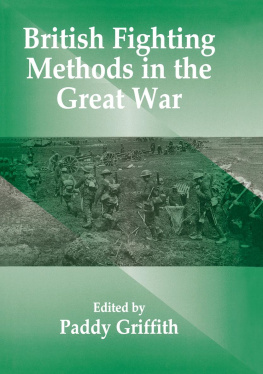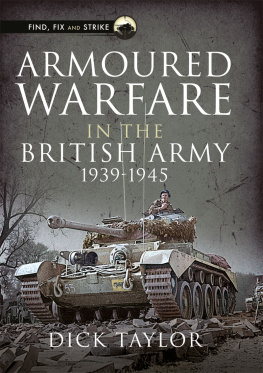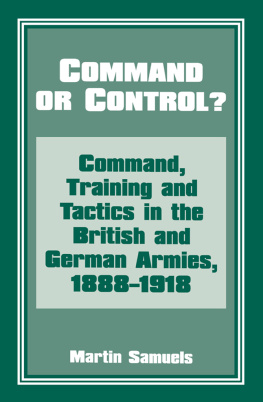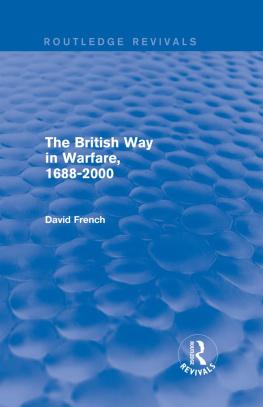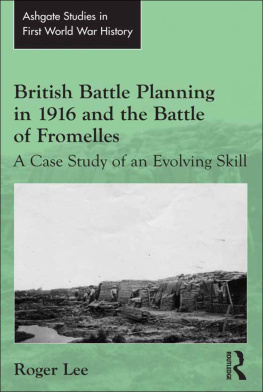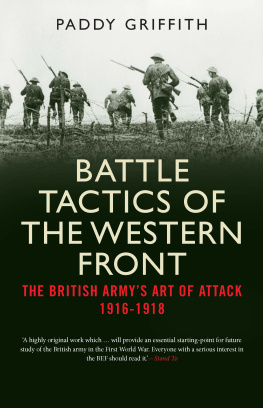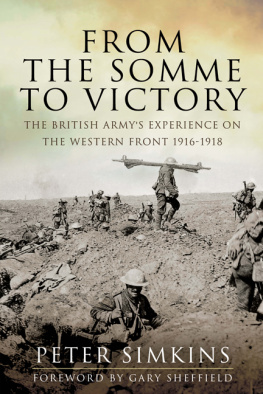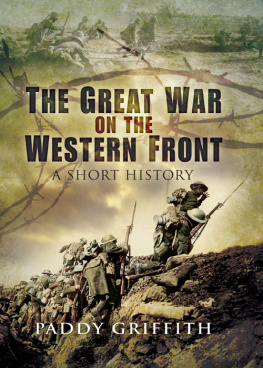First Published in 1996 by
FRANK CASS PUBLISHERS
Published 2013 by Routledge
2 Park Square, Milton Park, Abingdon, Oxon OX14 4RN
711 Third Avenue, New York, NY, 10017, USA
Routledge is an imprint of the Taylor & Francis Group, an informa business
Copyright 1996 Frank Cass & Co. Ltd.
British Library Cataloguing in Publication Data
British Fighting Methods in the Great War
I. Griffith, Paddy
940.40941
Library of Congress Cataloging-in-Publication Data
British fighting methods in the Great War / edited by Paddy Griffith.
p. cm.
Includes bibliographical references and index.
Contents: Reform in the British Army / Paddy Griffith British artillery in the Great War / Jonathan Bailey Co-stars or supporting cast? : British divisions in the Hundred Days, 1918 / Peter Simkins The operational role of British military police on the Western Front, 191418 / G.D. Sheffield The treatment of casualties in the Great War / Geoffrey Noon the rise of armour / J.P. Harris Cavalry and the development of breakthrough doctrine Stephen Badsey The SHLM project : assessing the battle performance of British divisions / John Lee.
1. Great Britain. Army. British Expeditionary ForceHistoryWorld War, 19141918. 2. Strategy. 3. World War, 19141918Great
Britain. 1. Griffith, Paddy.
D546.B76 1996
940.41241dc20
95-47978
CIP
ISBN 13: 978-0-714-63495-1 (hbk)
ISBN 13: 978-0-714-64468-4 (pbk)
All rights reserved. No part of this publication may be reproduced, stored in or introduced into a retrieval system, or transmitted, in any form or by any means, electronic, mechanical, photocopying, recording or otherwise, without the prior written permission of the publisher of this book.
Typeset by Regent Typesetting, London
Dr Stephen Badsey MA, wrote his Cambridge doctoral thesis on the British debate on cavalry, 18711921. He became a research assistant at the Imperial War Museum, where he catalogued the museum holding of Great War propaganda films, and then spent five years as an historical consultant and researcher for British television programmes, including Timewatch and the award-winning Soldiers. He is currently a Senior Lecturer in War Studies at the Royal Military Academy, Sandhurst, and a Senior Research Fellow of De Montfort Universitys Institute for the Study of War and Society. He has written or edited several military history books including The Crimean War (with Andrew Lambert), and The Gulf War Assessed (with John Pimlott).
Colonel J.B.A Bailey, MBE, RA, is currently Colonel Defence Studies, based at the Army Staff College, Camberley. Before that he commanded a field artillery regiment with the British Army of the Rhine. His book Field Artillery and Firepower, covering developments during the whole of the twentieth century, appeared in 1989 while he was a member of the directing staff at the Staff College.
Paddy Griffith is a freelance military author and publisher who worked for 16 years as a Senior Lecturer in War Studies at the Royal Military Academy, Sandhurst. His Oxford doctorate was awarded for a study of the French Army between the two Napoleons, and he has also contributed widely to the wargame hobby; but he is perhaps best known for his books of tactical analysis such as Forward Into Battle: Battle Tactics of the Civil War (American), and Battle Tactics of the Western Front, 191618.
Dr J. P. Harris is a former director of studies at a private college in London and is currently a Senior Lecturer in War Studies at the Royal Military Academy, Sandhurst, and a Senior Research Fellow with the Institute for the Study of War and Society at De Montfort University. He has a doctorate from Kings College, London and has published extensively, especially on British military planning between the world wars. He has recently completed a major study on the development of British military thought on armoured warfare up to 1939.
John Lee is Treasurer of the British Commission for Military History and one of the organisers of the SHLM Battle Assessment Study 19141918. He has MA degrees in Social and Economic History from Birkbeck College, London, and in War Studies from Kings College, London. He is the author of articles and a chapter on aspects of the career of Sir Ian Hamilton, and is currently completing books on Hamiltons life and on the battle of the Menin Road Ridge, 20 September 1917. He works in publishing.
Dr Geoffrey Noon qualified in medicine at Birmingham University in 1954, after which he served on a naval air station for two years and then as a general practitioner in Willenhall and especially the Tamworth area for over three decades, including part-time work as a casualty officer and anaesthetist with a particular interest in trauma and resuscitation. He has now largely retired from practice and is able to follow an interest in the Western Front which originated in the fact that his father and three uncles saw active service there. He is currently chairman of the Wolverhampton branch of the Western Front Association.
Dr G. D. Sheffield is a Senior Lecturer at the Royal Military Academy, Sandhurst, and author of a number of works including From Vimy Ridge to the Rhine, the Great War Letters of Christopher Stone DSO, MC (as co-editor); Warfare in the Twentieth Century; and the authorised The Redcaps: A History of the Royal Military Police and its Antecedents from the Middle Ages to the Gulf War. His doctoral thesis for Kings College, London was a study of officer-man relations, morale and discipline in the British Army, 190222, and he is currently Secretary-General of the British Commission of Military History.
Peter Simkins, Historian at the Imperial War Museum, is author of the definitive study of Kitcheners Army: The Raising of the New Armies, 191416, which was published in 1988. He is currently working with Dr G. D. Sheffield and John Lee on a book entitled Haigs Army, a study of the organisation, composition and performance of the BEF in France and Belgium from 1916 to 1918. Peter Simkins is an eloquent lecturer on Great War history, and one of the leading authorities in modern military studies.
Paddy Griflth
The public has a deep-seated belief that many of the British attacks made between 1914 and 1918 led to needlessly heavy casualties for negligible military gain. This impression arose from the shocking novelty of industrialised trench warfare during the first two years of war, when the military machine was largely unable to cope with the massive unplanned expansion of men and materil that was thrust upon it. Then, when the New Armies were finally assembled and thrown forward in what had been heralded as their decisive push on the Somme, on 1 July 1916, they met a notoriously bloody ruin.
For many people the first day of the Somme stands as an almost indelible image of futility, which could have been expunged only by a completely successful and rapid end to both the Somme campaign and to the Great War as a whole. Yet, unfortunately for the reputation of the British Expeditionary Force (BEF), there was to be no such happy outcome. This allowed critics to reinforce their preconceived stereotypes by taking a vindictively selective note of whatever operations could be counted as failures during the second half of hostilities. Thus, the first day of the Somme has been taken as typical of every other day of the battle; the mud and misery of the blighted Ypres salient have generally been taken as the norm during the whole of 1917, while the collapses of the following spring have been seen as encapsulating 1918.


